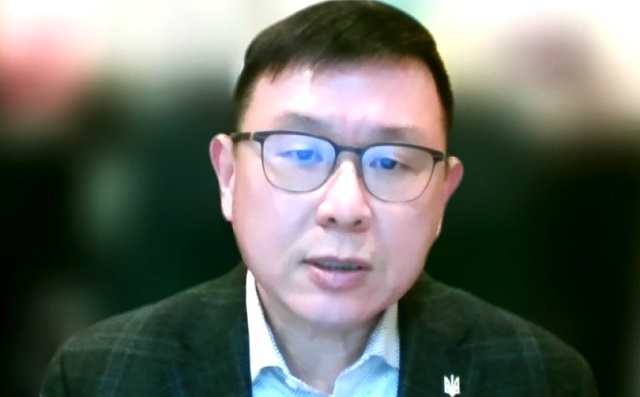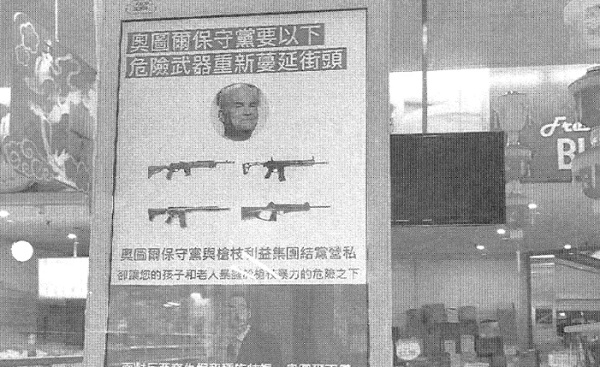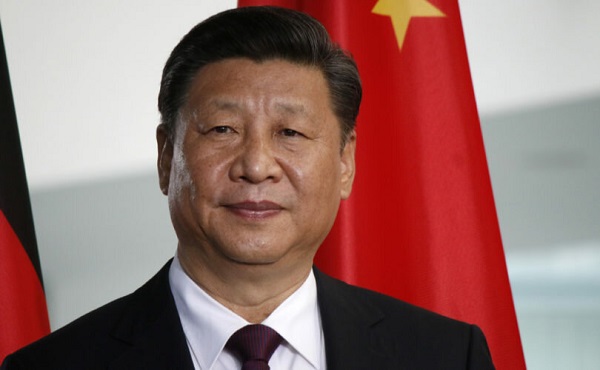Federal Election 2021
Conservative MP targeted by Communist China says he feels ‘betrayed’ by Canadian gov’t

From LifeSiteNews
Kenny Chiu said he was never shown copies of any security warnings that he was a target of CCP agents and subsequently lost his re-election bid in 2021.
Former Conservative Party of Canada (CPC) MP Kenny Chiu told the public inquiry looking into alleged meddling in Canada’s two most recent federal elections by Chinese Communist Party (CCP) agents that he feels “betrayed” by the federal government after only now learning he was the target of agents of the CCP.
“I have been betrayed,” said Chiu, who served as MP for Steveston-Richmond East, British Columbia, from 2019 to 2020, during testimony at the Commission on Foreign Interference earlier this week.
“That is how I see it.”
According to Chiu, he was never shown copies of any security warnings that he was a target of CCP agents. He subsequently lost his re-election in 2021 to the Liberal candidate Pam Bains by 3,477 votes.
In the past, Chiu had suspected that there were indeed CCP operatives working to undermine his campaign.
The Foreign Interference Commission, as it is known is being headed by Justice Marie-Josée Hogue, who had earlier said that she and her lawyers will remain “impartial” and will not be influenced by politics and began on January 29.
In January, Hogue said that she would “uncover the truth whatever it may be.”
Numerous internal memos have been released by the Commission that show that the Canadian Security Intelligence Service (CSIS) as well as others deemed that Chiu was indeed targeted by foreign agents of the CCP.
Commission Counsel Matthew Ferguson asked Chiu if he was “aware of any of these reports at the time?”
“No,” a visibly disturbed Chiu replied.
Before the 2021 federal election, Chiu had introduced a private members bill, Bill C-282 An Act to Establish the Foreign Influence Registry. This bill proposed that there be a mandatory disclosure of lobbyists who acted on behalf of any foreign government, individual, or even corporation. This is similar to what is already in place in the United States, the United Kingdom and Australia.
The evidence shows that Chinese-language media, who were inspired by CCP media, made false posts about Chiu’s bill, claiming that it would see Chinese Canadians placed in jail for “pro-China speech.”
Ferguson asked Chiu if there was anything he would have done or could have “done differently?”
“I may not have run for office,” Chiu replied, adding “As an immigrant, it is already very challenging to build a life here in Canada.”
When it comes to the CCP, many Canadians, especially pro-freedom Chinese Canadians, are concerned considering Trudeau’s past praise for China’s “basic dictatorship” and his labeling of the authoritarian nation as his favorite country other than his own.
The potential meddling in Canada’s elections by agents of the CCP has many Canadians worried as well.
‘My worry came true,’ says targeted MP
Chiu is a Hong Kong native who came to Canada in 1982 and served as a school trustee at the Richmond, British Columbia School District in 2011.
He noted that “when I became a school board trustee, I intentionally severed my ties with relatives in China with the understanding I would put them in danger.”
“In 2021, it seems like my worry came true,” he testified, adding, “I thought I would be protected by my country. I was deeply troubled, disappointed, that I was exposed, and the government doesn’t seem to care, and now through the Commission I have learned they have known all about it.”
Chiu said that it was like “I was drowning, and they were watching.”
“The best they could do, by the way, is let me know that I am drowning. I don’t need their notification. I need their help. That is the overall disappointment mixed in with the emotion of anger that I have,” he noted.
Of note is that last October, the House of Commons ethics committee unanimously adopted Chiu’s proposal for the creation of a public registry of foreign agents.
The public inquiry into alleged meddling in Canada’s two most recent federal elections by agents of CCP began last week with testimony from Chief Electoral Officer Stéphane Perrault, who confirmed he was secretly warned by security agents of irregularities in the 2019 election.
The Foreign Interference Commission, as it is known, “will examine and assess the interference by China, Russia and other foreign states or non-state actors, including any potential impacts, in order to confirm the integrity of, and any impacts on, the 43rd and 44th general elections (2019 and 2021 elections) at the national and electoral district levels.”
The first set of hearings, or “Stage 1,” will take place from now until April 10 and will include a host of witnesses, which will include Prime Minister Justin Trudeau and many others who have not been named.
Also set to testify is former Liberal MP Han Dong and former Ontario cabinet minister Michael Chan, both of whom have been victims of alleged CCP interference.
The “Stage 2” part of the public inquiry will take place this fall and will in particular look at the Trudeau government’s ability to both detect and fight foreign interference targeting Canada’s electoral processes.
The hearings are being held at the Library and Archives Canada building in Ottawa.
The federal government under Trudeau has been slow in responding to allegations of CCP election meddling after announcing on September 7, 2023, that it would be launching a public inquiry led by Hogue.
The public inquiry comes after Trudeau launched a failed investigation into CCP allegations last year after much delay. That inquiry was not done in the public and was headed by “family friend” and former Governor General David Johnston, whom Trudeau appointed as “independent special rapporteur.”
Johnston quit as “special rapporteur” after a public outcry following his conclusion that there should not be a public inquiry into the matter. Conservative MPs demanded Johnston be replaced over his ties to both China and the Trudeau family.
To date, the evidence that parliamentary committees have uncovered shows that Canadian authorities were aware that agents of the CCP were targeting MPs from opposition parties but decided against taking any action.
espionage
Groups CriDemocracy Watch Calls Hogue Foreign Interference Report “Mostly a Coverup”

A Hogue Commission document shows a 2021 election digital ad attacking then-Conservative leader Erin O’Toole in a Toronto-area grocery store that is linked to a pro-Beijing businessman.
Sam Cooper
Hogue Report Fuels Diaspora Fears Over Ottawa’s Foreign Interference Weakness
Friends of Hong Kong, a non-partisan diaspora group that withdrew from Ottawa’s Foreign Interference Commission a year ago over concerns it would whitewash Chinese interference and endanger diaspora groups, has issued a blistering rebuke of Commissioner Marie-Josée Hogue’s final report.
The group argues the 16-month inquiry fails to show the federal government can counter foreign interference.
In a statement detailing their misgivings, the human rights group says the final report “only serves to deepen our serious reservations regarding our government’s willingness and ability to tackle foreign interference.”
The group criticizes Commissioner Hogue for what they deem to be a pattern of “wilful blindness” in assessing the significance of alleged meddling in Canada’s democratic processes. They also take issue with Hogue’s characterization of foreign interference as “isolated cases,” emphasizing that “even one such case is too many for a democracy like ours.”
In February 2024, group leader Ivy Li explained its public statement and decision not to participate, citing concerns about the Commission’s “objectivity and security integrity.” She said these worries partly stemmed from the perception of Commissioner Hogue’s prior professional links to legal networks affiliated with various former Liberal prime ministers, and from a fear that the inquiry would not deeply probe China’s sophisticated, decades-long influence networks in Canada.
“Judge Hogue and her counsel are lacking expertise in how the Chinese Communist Party thinks and operates,” Li said, “[so] they will easily be manipulated in the whole process by Chinese Communist Party proxies.”
Li also pointed to Hogue’s past work at a Quebec law firm with ties to Pierre Trudeau and Jean Chrétien—two prime ministers known for deep political and business connections to the Chinese Communist regime and Liberal-linked industrialists—as a source of concern for Canadian Friends of Hong Kong.
Among the group’s critiques in a statement issued yesterday is a charge that Hogue “downplayed” the threats posed by transnational repression.
“Justice Hogue adds another blow to the confidence of the diaspora communities,” the group’s statement reads, noting many community members live “under constant fear and threats.”
The organization also disputes the commissioner’s assessment that parliamentarians with “problematic relationships” or “questionable ethics” merely acted naively. “It demonstrates a lack of understanding of the extent and threat that such parliamentarians pose to Canadian democracy,” the group warns, expressing fear that Hogue’s approach “will only condone more of such conduct.”
The Bureau is a reader-supported publication. To receive new posts and support my work, consider becoming a free or paid subscriber.
In addition, Canadian Friends of Hong Kong calls for immediate legislation to implement a Foreign Influence Transparency Registry. They urge that the registry’s scope extend beyond the Lobbying Act to include all political parties, all levels of government, and any appointed public office holders. They also call for granting the commissioner and registry full independence from the Prime Minister and Cabinet.
A second diaspora group, representing Uyghur Canadians, similarly withdrew from the Commission in January 2024. Both organizations cited concerns that senior officials with potential ties to the Chinese government were given high-level access during the proceedings. In a post to X yesterday, Uyghur Canadian group leader Mehmet Tohti wrote: “Downplaying the impact of hostile interference, infiltration, and influence in Canada by the [Commission] not only undermines the gravity of the threat but also sends a dangerous message—whether intentionally or not—that such activities can continue unchecked. … The Commissioner and the commission must recognize that this is not just a policy issue; for many of us, it is a matter of life and death.”
Meanwhile, Duff Conacher, a longtime transparency advocate with Democracy Watch, also took aim at Hogue’s final report, calling it “mostly a cover-up of foreign interference, because it ignores a dozen loopholes in federal laws that allow for secret, undemocratic and unethical spending, fundraising, donations, loans, lobbying and disinformation campaigns by foreign proxies.”
Democracy Watch stated the report “fails to recommend crucial reforms to Canada’s enforcement bodies, which remain politically dependent, slow to act, ineffective, secretive, and unaccountable.” The group added, “Any party that triggers an election before these changes are enacted should be shunned by voters for enabling foreign interference.”
The Bureau is a reader-supported publication. To receive new posts and support my work, consider becoming a free or paid subscriber.
espionage
China bragged it meddled in 41 candidates’ campaigns in Canada’s 2019 election: report

From LifeSiteNews
Toronto area ridings, including one in the city of Markham which saw Trudeau personally campaign in, are now under investigation by the ongoing Commission on Foreign Interference.
The Chinese Communist Party (CCP) boasted it successfully managed to get no less than eight of some 41 preferred candidates elected in Canada’s 2019 federal election, an investigative reporter’s findings have revealed.
Investigative journalist Sam Cooper, who works for The Bureau, recently made known that he was able to obtain an analysis published in February 2021 by a CCP-run group called All-China Federation of Returned Overseas Chinese (ACFROC), which included the shocking revelations.
The 2019 federal election saw Prime Minister Justin Trudeau’s Liberal government re-elected to a second term. In that election, there were no less than 41 “distinguished Chinese candidates” who were officially endorsed by the People’s Republic of China (PRC), in Toronto-area ridings that saw Trudeau personally campaign.
According to the ACFROC report, which is the main agency of the CCP’s United Front, a political group that connects mainland China to Chinese in other nations, “Trudeau Jr. personally went to seek votes at a Chinese supermarket in Markham, an area of Toronto where Chinese people live, demonstrating that Chinese votes play an important role in the general election.”
As it stands now, the Toronto area ridings, including one in the city of Markham which saw Trudeau personally campaign in, are now under investigation by the ongoing Commission on Foreign Interference. A report from the National Security and Intelligence Committee of Parliamentarians (NSICOP) has shown that there are no less than 11 candidates known to have been directly influenced by China.
The main goal of the ACFROC is to “mobilize diaspora networks” that are in line with the will of the CCP, as noted by Alex Joske, author of the 2022 book Spies and Lies.
The report said that popular Chinese app WeChat was used to mobilize voters, going all the way back to the 2015 and 2011 elections.
According to Charles Burton, an expert in the Chinese language who looked at the ACFROC report for The Bureau, the use of the term “distinguished” to refer to the Chinese candidates who were nominated “implies identification of candidates potentially useful to the United Front’s aims.”
“This article clearly aims to guide the agents of the Chinese Communist Party’s United Front Work Department in their strategic work to gain leverage for China by placing persons of Chinese origin into the Parliament of Canada,” noted Burton.
LifeSiteNews recently reported that Cooper unveiled how four politicians along with one government advisor were named as allegedly being involved in a scheme backed by the CCP to purposely interfere in Canada’s electoral process.
The Foreign Interference Commission was convened to “examine and assess the interference by China, Russia, and other foreign states or non-state actors, including any potential impacts, to confirm the integrity of, and any impacts on, the 43rd and 44th general elections (2019 and 2021 elections) at the national and electoral district levels.”
The commission is headed by Justice Marie-Josée Hogue, who had earlier said she and her lawyers will remain “impartial” and will not be influenced by politics. In January, Hogue said that she would “uncover the truth whatever it may be.”
As reported by LifeSiteNews, documents from a federal inquiry looking at meddling in Canada’s past two elections by foreign state actors show that agents of the CCP allegedly worked at Elections Canada polling centers during the 2021 campaign.
To date, Trudeau has been coy and has never explicitly stated whether he was ever told by the Canadian Security Intelligence Service (CSIS) that CCP agents’ actions were in breach of the nation’s Elections Act.
A few months ago, the head of Canada’s intelligence agency testified under oath that he gave Trudeau multiple warnings that agents of the CCP were going after Conservative MPs, yet the prime minister has denied receiving these warnings.
-

 2025 Federal Election1 day ago
2025 Federal Election1 day agoRCMP memo warns of Chinese interference on Canadian university campuses to affect election
-

 2025 Federal Election1 day ago
2025 Federal Election1 day agoResearchers Link China’s Intelligence and Elite Influence Arms to B.C. Government, Liberal Party, and Trudeau-Appointed Senator
-

 MAiD2 days ago
MAiD2 days agoDisability rights panel calls out Canada, US states pushing euthanasia on sick patients
-

 Justice2 days ago
Justice2 days agoCanadian government sued for forcing women to share spaces with ‘transgender’ male prisoners
-

 Alberta2 days ago
Alberta2 days agoAlberta takes big step towards shorter wait times and higher quality health care
-

 Energy2 days ago
Energy2 days agoTrump signs four executive orders promoting coal industry
-

 COVID-1922 hours ago
COVID-1922 hours agoFauci, top COVID officials have criminal referral requests filed against them in 7 states
-

 COVID-191 day ago
COVID-191 day agoBiden Admin concealed report on earliest COVID cases from 2019











